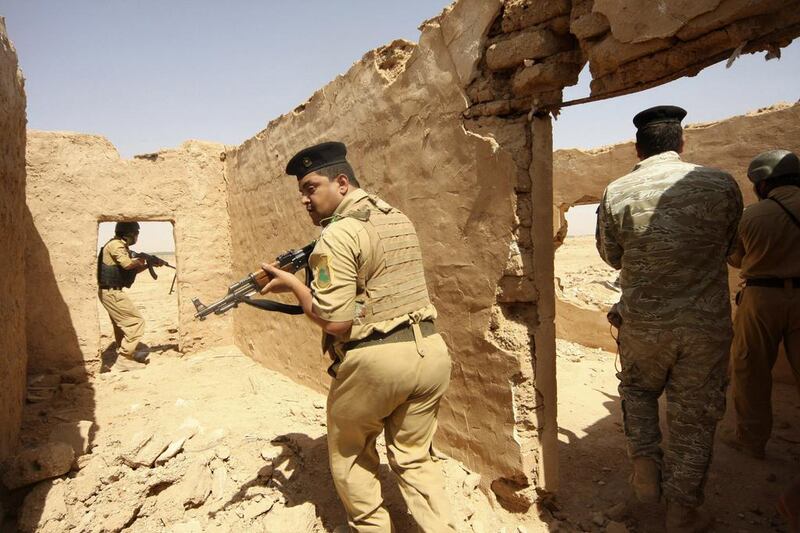BAGHDAD // The fallout from this month’s blitz by Sunni militants through the north and west of Iraq has produced countless negative effects on the country.
There’s been the stoking of Sunni-Shiite tensions, the Kurdish takeover of the oil-rich city of Kirkuk, and the disintegration of large segments of Iraq’s military, along with the loss of millions of dollars’ worth of its equipment.
Iraq’s outlook has not looked so bleak since the dark days of sectarian bloodletting in 2006-2007 when tens of thousands perished and the country moved to the brink of civil war.
But what lies ahead in the short and medium term may be a great deal worse.
It appears that Iraq is moving towards a de facto partition, breaking up into three warring enclaves: One comprising Baghdad and the Shiite south under Iranian influence, a central Sunni region that may at least temporarily be ruled by militants of the Islamic State of Iraq and the Levant, and an expanded Kurdish region in the north, complete with Kirkuk and pockets of Ninevah and Diyala provinces.
It is a nightmare scenario for everyone. The majority of Shiites, who, since their empowerment following Saddam Hussein’s 2003 removal, dreamt of ruling over a nation stretching from the waters of the Gulf in the south all the way to the Syrian desert and the mountainous north, will end up with a much smaller state effectively ruled by Tehran’s clerical establishment.
It will not be any better for the Sunnis, either, unless they drive ISIL militants out and then find ways to make a self-ruled Sunni region economically viable, by tapping the area’s natural gas reserves for example.
At the outset of the crisis, it looked like the Kurds were the ones who benefited from the chaos resulting from the incursion by ISIL fighters into the north, realising their longtime dream of annexing Kirkuk and other areas of Diyala.
However, if the Sunni militants remain in areas bordering their self-ruled region, there will not be any peace. Many in Iraq have long viewed the Kurds as opportunists and staunchly disputed their claim to what they see as Arab territory, including Kirkuk.
The threat of partition has loomed over Iraq for several years now, but never did the prospect look as likely as it does now, and it is not just because of the mayhem created by ISIL.
The thirst for partition has been brewing for some time and Iraq’s Shiite prime minister, Nouri Al Maliki, is mostly to blame.
Mr Al Maliki’s sectarian and heavy-handed policies toward the Sunnis, for example, has fed their anger and frustration.
His critics say he allowed his security forces to get away with countless abuses against the Sunnis and dealt harshly with their attempts to protest his policies.
The present crisis over ISIL, moreover, confirmed their longtime suspicion that Mr Al Maliki has forged close ties with non-Arab, Shiite Iran, allowing Iraq’s neighbours to wield much influence over the country.
Mr Al Maliki, in his hour of need, invited the commander of Iran’s Quds Force, General Qassim Soleimani, to Iraq to advise the country’s military commanders on bolstering the capital’s defences, as well as the protection of Shiite shrines in Baghdad, Samarra to the north and Najaf and Karbala south of the capital.
Further evidence of Iran’s deep involvement came from US officials who revealed that Iranian drones were flying reconnaissance missions over Iraq. More ominously, however, Mr Soleimani has conferred with leaders of Shiite militias blamed for many of the killings during the sectarian conflict in 2006 and 2007.
But while Iran’s deep military involvement in the ongoing conflict is troubling enough, Mr Al Maliki’s silence on the growing signs of another round of sectarian violence has further eroded confidence in his leadership and may eventually push Sunnis closer to ISIL and bolster the desire to have a region of their own.
Bodies of Sunnis with gunshot wounds to the head and chest are turning up in growing numbers on the streets of Shiite districts of Baghdad and there has been a growing number of tit-for-tat attacks between Sunnis and Shiites in the areas south of the city, which are known as the “triangle of death”.
Mr Al Maliki’s relations with the Kurds, meanwhile, have been fraught with tension for much of his eight years in office.
But the latest Iraqi crisis has plunged those relations to their lowest point since Saddam’s removal in 2003.
Mr Al Maliki has been careful in public not to directly accuse the Kurds of taking advantage of the chaos to make a land grab, but he has dropped many hints to that effect.
However, several of the prime minister’s supporters, including Shiite militia leaders, were more overt with such charges. They also claim that the Kurds stood by and watched as ISIL fighters swallowed big chunks of the north when they could have stopped them.
The Kurds’ response has been that their actions were aimed at filling the security vacuum left by fleeing Iraqi troops.
If they did not, ISIL would have captured Kirkuk, they claim.
Now, the Kurds speak of a new Iraq following ISIL’s blitz, saying things cannot go back to the way they were amid growing calls for declaring the independence of Iraqi Kurdistan.
foreign.desk@thenational.ae





